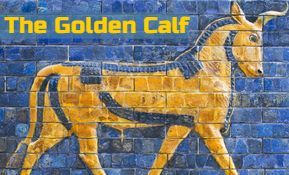
Korach: Korach’s Rebellion
Korach began an outright rebellion, which attempted to overthrow Moshe (Moses) and Aharon (Aaron) as leaders of the nation....

Envy
“Korach the son of Izhar, the son of Kohath, the son of Levi separated himself, with Dathan and Abiram, the sons of Eliab, and On the son of Peleth, descendants of Reuben” (Bamidbar 16:1).
Korach began an outright rebellion, which attempted to overthrow Moshe (Moses) and Aharon (Aaron) as leaders of the nation.
Rashi quotes the Sages’ question: “What made Korach decide to quarrel with Moshe? He envied the chieftainship of Elizaphan the son of Uzziel whom Moses appointed as chieftain over the sons of Kohath by the Divine word. Korach claimed, ‘My father and his brothers were four in number… Amram was the first, and his two sons received greatness – one a king and one a Kohen Gadol. Who is entitled to receive the second position? Is it not I, who am the son of Izhar, who is the second brother to Amram? And yet, Moshe appointed to the chieftainship the son of his youngest brother! I hereby oppose him and will invalidate his word.’” (Midrash Tanchuma Korach 1, Bamidbar Rabbah 18:2).
Korach was stricken with envy, and the Sages teach (Avot 4:21): “Envy, lust and honor drive a man from the world.” Envy can cause someone to lose his grip on sanity and be led astray from the proper path in the world.
In Sichot Mussar, Rabbi Chaim Shmuelevitz explains how negative character traits can drive a man from the world.
The yetzer hara, the evil inclination, does not usually attempt to suddenly override a person’s moral restraints and sweep him into sin. The yetzer hara employs the strategy of ‘little by little.’ In the words of the Sages: “Today he tells you to do this and tomorrow he tells you to do that.”
The yetzer hara, however, has yet another avenue of attack. Rabbi Shmuelevitz demonstrates this with a fascinating piece of the Talmud that analyzes the wisdom of the Hebrew alphabet.
The “ה” of Existence
“These are the products of the heaven and the earth when they were created” (Bereishit 2:4). The Hebrew states: “Behibaram,” “when they were created. In the Torah scroll, the letter hey — ה – is smaller than the other letters, as if to draw our attention to a vital point.
The Talmud (Menachot 29b) teaches that Hashem created the physical world with the letter hey. From this fact they derive that the Hebrew can be also interpreted to mean: “Behibaram, with a hey He created them [heaven and earth].” On a spiritual level, the world was designed in a way that is similar to a hey. The bottom of the ה is wide open; anyone who wants to “leave the world” may do so. The path to ruination and sin is wide open.
The ה, however, has a tiny opening at the upper left hand corner, to show that whoever chooses to return in repentance will find that there is an opening at the top to come back inside.
But why can’t a person return in the same way that he left? Why does he need a different opening? Rabbi Shimon ben Lakish explains that this according to the Mishlei (3:34): “If one goes to the scoffers, he will scoff; but if he goes to the humble, he evokes grace.”
“From here we learn that one who comes to purify himself, Heaven assists him, but one who comes to defile himself, Heaven opens up the way for him” (Menachot 29). Rashi explains that this represents the special assistance given to the Jew who is returning in teshuvah, repentance, symbolized by the additional small opening at the top of the hey.
Departure from the world is swift, unlike the “little by little” approach of the yetzer hara. This is represented by the wide-open bottom of the ה, “anyone who wants to leave the world may do so.” Confronted with a sudden frontal attack that causes one to completely lose control, one can slide down the slippery slope of immoral behavior. If he wants to come back, he needs special Divine assistance, represented by the small opening “at the top of the ה” to return to the world of balance and morality.
This is the deeper meaning of the Sages’ statement: “Envy, lust and honor drive a man from the world” (Avot 4:21). The sudden frontal blows of the yetzer hara threaten to topple us off the “balcony.”
Making a Mockery
Now we can understand how Korach’s envy drove him to foolishness. But how did Korach succeed in convincing 250 outstanding men to join him in his rebellion? The Torah relates that the men who confronted Moshe and the children of Israel were: “Chieftains of the congregation, representatives of the assembly, men of repute” (Bamidbar 16:2). How did Korach convince outstanding men who were not influenced by jealousy and lust for honor to join his rebellion?
The explanation lies in another Midrash cited by Rashi:
“What did Korach do? He went and assembled two hundred and fifty men, heads of Sanhedrin, most of them from the tribe of Reuven, his neighbors. These were Elitzur the son of Shedeur and his colleagues, and others like him, as it says, ‘chieftains of the congregation, those called to the assembly.’ And further it states, ‘These were the chosen ones of the congregation’ (Bamidbar 1:16).
“He dressed them with cloaks made entirely of blue wool. They came and stood before Moshe and asked him, ‘Does a cloak made entirely of blue wool require fringes [tzitzit], or is it exempt?’ He replied, ‘It does require fringes.” They began laughing at him saying, ‘Is it possible that a cloak of another colored material, one string of blue wool exempts it [from the obligation of techelet – the fringe made with blue wool], and this one, which is made entirely of blue wool, should not exempt itself?’” (Midrash Tanchuma Korach 2, Bamidbar Rabbah 18:3).
Korach asked more such questions, and each time Moshe answered, Korach exclaimed: “Moshe, you were not commanded in these mitzvot; you made them up by yourself!”
Korach’s questions were ridiculous, vain attempts to show that the Torah was nothing more than “illogical”, products of Moshe’s imagination. Why would such a brilliant man as Korach ask such foolish questions? How did he succeed in convincing the 250 tribal leaders, heads of the Sanhedrin, to join his rebellion and eventually deny the Torah’s Divine origin?
Rabbi Shmuelevitz points out Korach questions were pure mockery. The Midrash describes how they dressed themselves in blue cloaks, apparently for its dramatic effect, and then laughed at Moshe’s reply.
In the Talmudic section concerning the “the ה of existence,” Rabbi Shimon ben Lakish quotes from Mishlei (3:34): “If one goes to the scoffers, he will scoff; but if he goes to the humble, he evokes grace.” Scoffing and mocking the Torah’s mitzvot is one of the “grand exits” from the ה of correct existence, which misleads even the cleverest individuals with it power.
Rabbi Moshe Luzzato, the Ramchal, writes in Mesillat Yesharim: “One of the deterrents to watchfulness is laughter and mockery. He who is immersed in it is as one who is drowning in a great ocean, from which it is extremely difficult to escape. For laughter affects a person’s heart in such a manner that sense and reason no longer prevails in him, so that he becomes like a drunkard or an insane man, whom, because they cannot accept direction, it is impossible to advise or direct.”
Under the influence of mockery, man loses his divinely given balanced mind, and “departs” from the world. Once the fence is broken and one falls over the parapet, there is no stopping the headlong descent off the “balcony.”
The Ramchal continues: “Consider the great severity and destructive power of mockery. Like a shield smeared with oil, which wards off arrows and causes them to fall to the ground, not permitting them to reach the bearer’s body, is mockery in the face of reproof and rebuke.”
The effect of one little bit of mockery and laughter is so great that it can cause a person to cast aside his intellect. “The force of levity flings everything to the ground so that no impression whatsoever is made upon Him. This is due not to any lack of understanding on his part, but to the power of mockery, which obliterates all facets of moral evaluation and fear of God” (Mesillat Yesharim, 5).
Rabbi Moshe ben Yaakov Cordovero in Tomer Devorah points out that the small opening in “the ה of existence” is near the top. Even someone who has tumbled over the precipice and “departed from the world” can return, with Divine assistance. And when he does, he will find himself at the top of the ה!
“In the place where penitents stand, even the truly righteous cannot stand!” (Berachot 34b).
May Hashem always help us to choose the true and straight path, and may we never be led astray by envy or mockery like “Korach and his congregation.”










Tell us what you think!
Thank you for your comment!
It will be published after approval by the Editor.